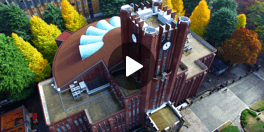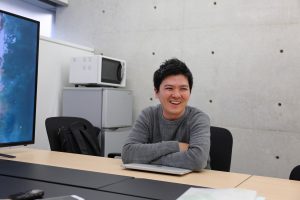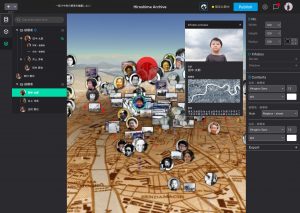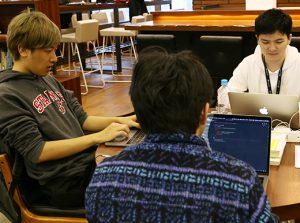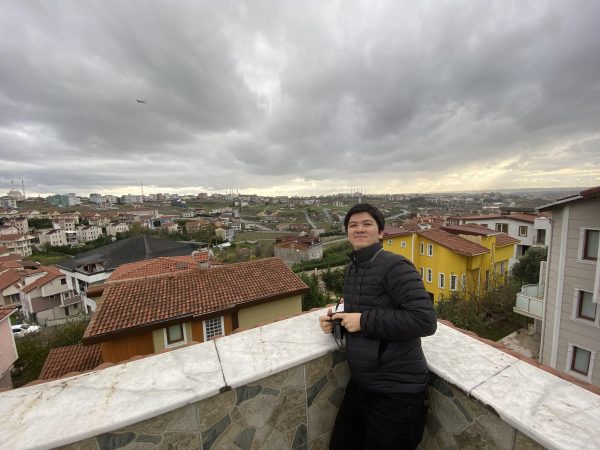
January 24, 2020
「すべてを保存する」無邪気な問いの力:「APLLO」田村賢哉さんインタビューWhat is "archiving everything"?: an interview with Tamura Kenya, developer of the open-source database APLLO
学際情報学府博士課程に在籍しながら、2017年にダーウィンエデュケーション株式会社を立ち上げ、新技術を用いるオープンソース・データベースシステム「APLLO」の開発を手掛けている田村賢哉さん。今年4月、このAPLLOを応援するファンドが、日本国内クラウドファンディング史上最高額を達成して話題を呼びました。
APLLOは、データの関連性だけではなくて、その意味や解釈を構造的に格納でき、情報の「文脈」まで捉えることを可能にする新しい形のオープンソース・データベースです。すでに国連国際学校、米ウィルミントン大学、凸版印刷株式会社など、国内外の様々な団体、プロジェクトで活用されてきました。
APLLOの開発には、空間情報のアーカイブと再表現に取り組んできた田村さんの研究成果が活かされています。修士までずっと地理学を専攻していた田村さんは、博士課程(首都大学東京)からは芸術工学分野に身を置き、昨年から学際情報学府(渡邉英徳研究室)に移って研究を行っています。芸術工学のフィールドでアートやデザインに触れたことがGeographyのGraph、すなわち記述することに真摯に向き合った経験だとすれば、今度はGeoの部分に迫りたいと言います。また「Geo」に立ち戻り、「地の理とは何か」を探る中で、「見知らぬ土地に行って情報を集めたかつての地理学者の仕事は、現代においては何だろう」と思ったのがAPLLO構想の始まりでした。
APLLOは田村さんの表現によると、「これから200年以上かかるかも知れない」長期プロジェクトです。データの文脈や解釈、質感、情報自体の可変性など、既存のデータベースでは削ぎ落とされるものを含めて「すべての情報を保存する」という、一見あり得なさそうなことをその目標にしているためです。
そういったAPLLOの根底にある「無邪気な問い」が、研究においても大切だと田村さんは言います。「今、世の中では、分かりやすいものやすぐに成果が出るものというのを大事にしがちなんですけど、長くやることが大事だと思っています。そして何かを長くやるために大事なのは、例えば『全ての情報を保存するとは何か』といったような無邪気な問いではないかと思っています。」そうした無邪気さを大切にしながら、学際情報学府の仲間とも一緒に研究や色々な活動をやっていけたら、と話していました。
記事:安ウンビョル(博士課程、編集部)
英文校正:デイビッド・ビュースト(特任専門員、編集部)
Tamura Kenya, a Ph.D. student in the GSII and the founder and director of Darwin Education, has been developing an open-source database system called “APLLO.” In April of 2019, APLLO made headlines for reaching the highest fund-raising price in the history crowdfunding in Japan.
APLLO is a new form of open-source database that can capture the “context” of information by structurally storing the meaning and the interpretation of data, not only the relevance of data. It has already been used by various domestic and international organizations and projects, including the United Nations International School, Wilmington University in the United States, and Toppan Printing Co. Ltd.
The development of APLLO leverages Tamura’s research efforts to archive and represent spatial information. Having majored in geography until his master’s degree, Tamura devoted himself to the field of art engineering at the Tokyo Metropolitan University for his doctoral research. After that, he moved to the Watanabe Hidenori Laboratory of the GSII. Tamura sees his study of art engineering as dealing with the ‘graph’ part of ‘geography’. His current work returns to the ‘geo’ part. While pondering the idea of ‘geo’, he arrived at a question: “In the past, geographers were people who worked to collect information on lands they were utterly unaware of. What kind of work can be the same thing in the present day?” This question was the beginning of APLLO.
According to Tamura, APLLO is a long-term project that may take over 200 years to complete because it has the seemingly impossible goal of “archiving all information”, including the context, interpretation, texture, and variability of data itself that have usually been omitted from existing database systems.
Tamura says that such an ingenuous goal existing at the base of APLLO is also crucial in doing research. “Now the world, people tend to value things that are easy to understand and easy to achieve, but I think it is valuable to do something for a long time. And what is essential when someone does something for a long time is a simple and ingenuous question like what is it to archive all information.” He added that he hopes every colleague in the GSII also values such simplicity in their research.
Text: Eunbyul Ahn (PhD student, the editorial committee)
Proofreading: David Buist (Project senior specialist, the editorial committee)

